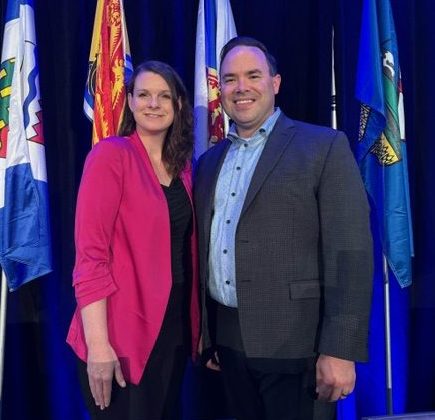
Saskatchewan Rivers School Division rural trustee and Saskatchewan School Boards Association (SSBA) President Jaimie Smith-Windsor will be taking on a new role.
At the Canadian School Boards Association (CSBA) AGM in July Smith-Windsor was acclaimed as vice president of the national organization.
Smith-Windsor said that she was humbled to be able to bring her advocacy work to the national level.
“For me, it’s a real honour to be able to represent school boards and to represent school boards at a national level. I think there’s a big opportunity for when you get involved at the national level to elevate some key priority areas for school boards in the provinces of Saskatchewan, but also in jurisdictions across Canada,” Smith-Windsor said,
“And there’s some really exciting work that the CSBA has underway and I’m looking forward to getting involved and contributing to that work,” she added.
Smith-Windsor explained that across Canada each jurisdiction is unique, but the same fundamentals of elected school boards exist across Canada.
“Strategic representation of communities through the election of school board trustees is a cornerstone of the work that is done at the national level, and I think it’s just it’s just such an important part of what we do and I’m looking forward to contributing to that,” Smith-Windsor said.
She highlighted several projects for the CSBA including a partnership with the University of Regina creating modules for trustees specific to anti-racism and equity in school board governance.
“It was made with the involvement of trustees for trustees and supported by the University of Regina, which I think is a really neat provincial connection,” she said.
“I think it’s becoming more important to take a look at the governance level and the decision-making tables and making sure that there is diversity and representation from across different equity groups at those tables and I think I think that’s important work to consider.”
She also pointed to work being done at the national level around Indigenous education.
“This past July at our National Congress, we had our first ever Governance Partnership Award, which is awarded to school boards who are partnering with First Nations in innovative ways at the governance level to focus and advance reconciliation,” she said.
“So (I am) excited about some of the promising practices that we are able to support through the national work.”
To this end, the CSBA is also working with external organizations looking at implementation and accountability around the TRC Calls to Action. The CSBA is currently working through the recommendations of those organizations with membership.
“We’re also doing some important advocacy in Indigenous language revitalization and some opportunities there,” Smith-Windsor said.
One of the four pillars for advocacy for the CSBA is related to comprehensive school health. One recent example is the National School Food Program policy announced last spring, which was advocated for by the CSBA.
“That’s exciting. Canada is the only G7 country that does not currently have a National School Food Program with the announcement last spring of that work, that was a real success for the Canadian School Boards Association for all school boards in Saskatchewan and all jurisdictions and all of the partners and community organizations who have worked towards this,” she said.
She said that the program was a big deal and was a success at the advocacy level and policy level. Smith-Windsor thinks there is an opportunity for school boards to innovate in the program.
“Saskatchewan is a great example. There isn’t a lot of existing policy that is going to get in the way of true innovation around the delivery of school food programs. So we hope that as programs develop, they can be culturally relevant and very responsive to our communities, “ she said.
One example in Saskatchewan is the possibility of farm-to-school nutrition programs.
“There’s some really neat things that are starting and it’s nice to be part of that,” she said.
Another project is a partnership with Western University and a research team to look at trustee and school board concerns about the loss of involvement of the general public in school system decision-making in jurisdictions across Canada.
“In some cases, that has meant the removal of boards of education as part of the decision-making structure and then in other parts of the country there’s a notable shift away from public involvement in school board decision making, and so that research is really important,” she said.
She said that school board democracy and the election of school boards is a hallmark of democracy in Canada.
“Some province’s school boards predate the formation of the province itself, and it’s just such an important way for communities to have a voice in education and to ensure that education always belongs to community in their respective jurisdictions,” she said.
Smith-Windsor explained that the research has provided strong recommendations for school boards on how to promote democratic participation at the school board level.
“I’m excited to be part of that work,” she said.
Smith-Windsor is excited to bring the national work to the Prince Albert region.
“Education is often thought of as the provincial jurisdiction, but increasingly there is more and more happening at the national level that is very relevant to our communities,” she said.
Examples of this are Indigenous education and early learning.
“A lot is going on nationally and I think it’s just a great opportunity to provide some Saskatchewan perspective at a national level and I’m looking forward to the opportunity,” Smith-Windsor said.
Alan Campbell from Manitoba was re-elected as president.

